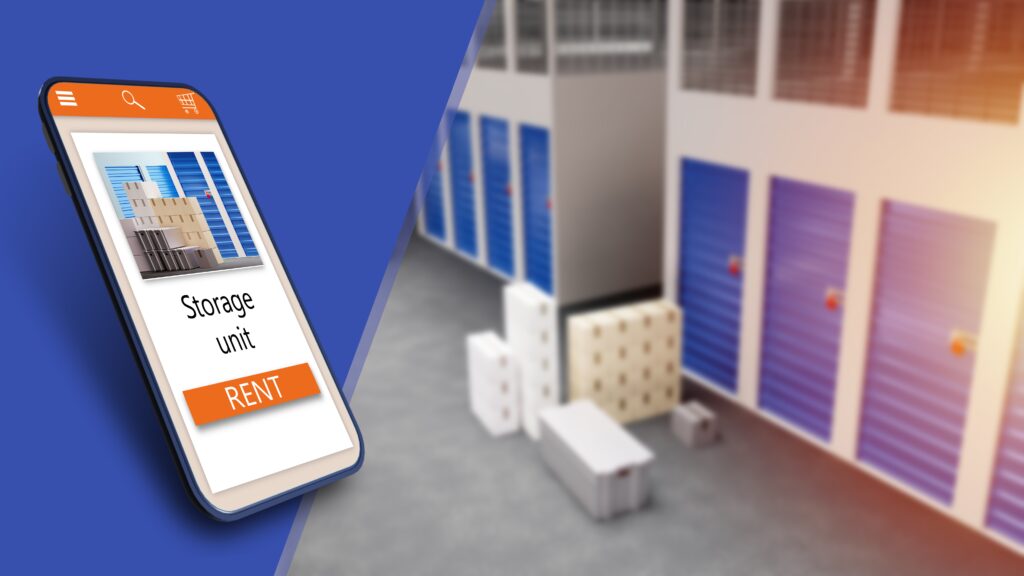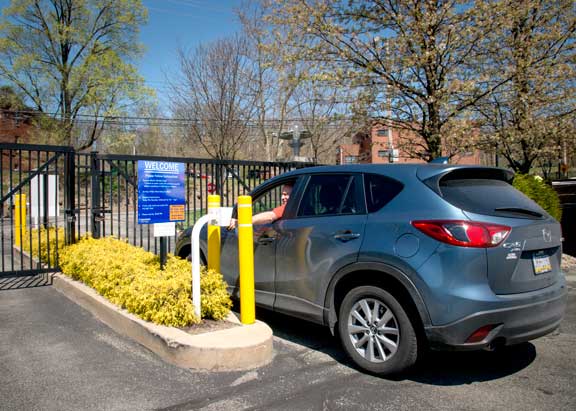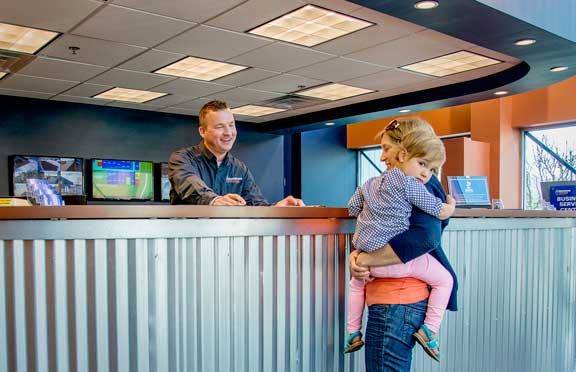What to Look for When Choosing a Self-Storage Unit
It’s Not as Daunting as It Might Seem!
So, you’re downsizing to a smaller house or perhaps moving into an apartment. Or, you’re newly married, and you’re combining households. Maybe an elderly parent is now going to be living with you. Or, your youngest child has decided to move back home to attend grad school. Might be that you need to store an overflow of equipment or inventory for your business.
All of these moments require you to create more space in your existing home, apartment or business, without selling, donating or ditching the items presently housed there.
The truth is, this is just a small sampling of the myriad of reasons for needing a self-storage unit. We’re quite sure that you can think of many more. Life is unpredictable, but the hunt for the perfect self-storage unit doesn’t need to be quite so uncertain. Renting a storage unit for the first time isn’t as daunting as it may initially seem.
You can’t just throw a dart at a map to choose a self-storage company at random and expect to be fully satisfied with your choice. If, however, you are prepared with a list of questions, and you have done your research, the rental process can be quite smooth. Knowing ahead of time what items you want to store, how long you will need to rent the self-storage unit, and just how much storage space you will need is going to make the process of renting a self-storage unit significantly more manageable.
Let’s review some of the critical issues you need to explore prior to making a final choice.
Can I Afford Self-Storage?
The very first question you need to ask yourself, way before you begin the quest for a suitable storage facility, is whether or not you can afford self-storage. As you might suspect, self-storage convenience costs depend on many fundamental factors, such as:
- Self-storage unit size. Typically, the smallest space you can rent is 5’ X 5’, about the same size as a small home closet. From here, you can go up in size, according to your specific budget and needs. As for costs, expect to pay a monthly rent of somewhere between $60 and $100 for the smallest storage units, but do keep in mind that other factors like the type of unit – climate controlled or drive up – will factor into the cost as well as the size of unit you choose.
- Location. Location. Location. If you need regular access to your stored belongings, renting a storage space that is more than 3-5 miles away from your home may not be the right decision. Not only will you waste time on the road, but you will be paying for the extra fuel and the added wear and tear on your vehicle. Conversely, if you are going be accessing your stored goods infrequently, a good self-storage location in a more affordable area can be cost-effective.
- Good Fit. Self-storage amenities are not one size fits all, and your choice should depend in part on your personal needs. If, for example, you’re storing items that were previously kept in your detached garage, a climate-controlled unit may not be necessary for the belongings you wish to save.
Storage Fact: The idea of publicly used storage is at least twice as old as the Great Wall of China, about 6000 years. In what is now Xi’an, China, natives would place their valuable possessions in clay pots and bury them underground in a pit. There were even guards stationed at the pit site to ensure that people only took from the pot they owned and did not steal from others.
Make a List . . . and Check It Twice
As mentioned, self-storage units are available in a wide range of sizes. To best determine a storage unit size that fits your needs, take an inventory of all of the items you want to store. Making an inventory list is useful since you’re less likely to forget large furniture items that will require more space, but it’s easy to overlook little items that will require additional boxes. And always remember to prepare for future storage needs. It’s highly likely you will need to store more items down the road. So, consider adding those to your list now to help ensure that your space will accommodate those items both now and in the future.
Once you have all your items listed, be sure to measure the more substantial pieces, and even plan out the space that stacked boxes are likely to take up. Having a rough measurement will narrow down the process of shopping for differently sized storage units.
If you’d like to see a list of storage unit sizes that are offered, you can look online for visual estimators. Guardian Storage offers a great “Self-Storage Size Guide” on our website!
Know What You Can’t Store!
There are rules regarding what you can and cannot store. Usually, this includes animals, perishables, firearms (varies by state, make sure you check first), explosives, flammable items, noxious or hazardous materials, and stolen property. If you’re unsure, ask the self-storage property manager before going forward with the rental process.
Storage Fact: Diane Brown of California inherited her mother’s belongings upon her passing and moved them to a self-storage unit for years before finally going through the contents. In the cleaning, she found a manila envelope that she assumed to be old, worthless papers in which she almost threw away. However, upon opening, she discovered original, never-published publicity photos of Amelia Earhart taken just before the departure of her final flight around the world.
Better Safe than Sorry
Leaving behind items you’ve worked hard to obtain or that have sentimental value can invoke a sense of anxiety and worry. You want to feel confident in the storage company you choose as the place to store your most prized possessions. Some of the features of a top-of-the-line storage company should include:
- Fence: Does a secure fence in good repair surround the entire complex?
- Gate: Is there a keypad-equipped gate that only an access code can unlock?
- Illumination: Is the entire facility well lit? Not just outside, but inside the storage units as well?
- Surveillance System: Is there a modern alarm system and security cameras to monitor and record activities around the exterior, as well as inside the storage buildings?
- Fire Prevention: Are smoke detectors, fire alarms and sprinkler systems installed to reduce the risk of fire?
- Self-Storage Unit Door: Is the door to your unit in excellent condition with no visible problems? Does it open and close smoothly and is the seal water-tight?
- Manager on Duty: Does the property have managers and/or employees located on-site? Having an impressive surveillance system is great, but useless if no one is watching.
- Pest Control: Does the storage company practice preventative pest control consistently to keep pesky bugs and critters out of your unit?
Feel secure when your store. Guardian Storage uses a state-of-the-art security system as well as a full on-duty staff to monitor location activity.
Do I Need 24-Hour Access?
Depending on how often and at what times you are likely to need access to your storage space, regular weekday access may or may not be sufficient. Not every self-storage location is open 24/7, so if evening and weekend access is essential to you, make sure to check the site’s hours of operation before signing a contract.
Think about this scenario: you need a stored item urgently! But, you can’t get it out of your self-storage location until two days from that moment of necessity. The company you chose has limited hours for storage unit access. Are you going to be okay with a situation such as this?
Storage Fact: The modern self-storage industry gives credit to the Collum family, who founded the very first self-storage business in Ft. Lauderdale, FL, in 1958. Clients had to pay a nominal fee to gain access to a clean, spacious unit that could provide shelter for a wide range of items and goods.
To Climate Control or Not to Climate Control
You know what they say, “If you don’t like the weather, wait 15 minutes, it’ll change.” The fluctuation in temperature and humidity are the primary culprits when it comes to inflicting damage on wooden furniture, fabrics and other such items. It’s not uncommon to find wood that has warped or fabric that has mildewed in a standard storage unit. To protect those items from the environment, consider using “Climate Controlled” storage. The most basic level of climate control guarantees your storage unit will remain within a specific temperature range. Some self-storage locations also offer humidity control in tandem with temperature control, so ask your property’s management team if you’re unsure.
If you already know you will need long-term storage for delicate items, you should consider choosing to upgrade to a climate-controlled unit to ensure the safety of your belongings.
Will you want to switch out the storage contents seasonally?
You might want to store your summer wardrobe or seasonal household goods such as patio furniture during the winter months. Likewise, during the summer, you may want to store the family’s skis, the snow blower, and shovels. Space may vary for these items and perhaps even the need for climate control. Make sure that you consider all your possible needs before renting your unit.
Guardian Storage offers climate-controlled units in varied sizes. Our on-location storage experts can help you choose a unit that will fit your belongings just right!
A Scout Is Trustworthy . . . Is Your Storage Company?
When you store your “stuff” somewhere other than in your home, you want to be sure that you can trust the storage company so choose carefully. But what makes a trustworthy self-storage brand?
- Check their online reviews – Look online at sites like Yelp or Google for both ratings and customer feedback. Like all online comments, you may want to take reviews with a grain of salt, but if they’re all terrible or there’s a recurring theme, you may want to steer clear.
- Look for photos – Do their social media photos match what you see in person?
- Talk to staff – Whether on the phone or in person, pay close attention to the way they speak to you. Do they seem honest and confident in what they are saying?
Storage Fact: There are more self-storage units in the U.S. than McDonald’s and Starbucks combined.
Know Your Insurance Plan
It’s essential to have insurance on your belongings if you’re planning to store long-term, especially if you are going to store items of high-value. Call your insurance agent first to find out if your existing homeowners’ or renters’ insurance policy can cover your stored possessions; while many do, the extent of coverage may vary by insurance company. You may find, for example, that you need to choose a unit with specific security features or climate control to qualify for coverage. If this is the case, you should check with storage facility management if you can purchase a protection plan from them.
Storage Fact: The total amount of self-storage space in the U.S. totals 2.3 billion square feet. That is equal to 82.5 square miles. If you combined all the self-storage facilities in the U.S., they would almost equal the size of Las Vegas (83.3 sq. miles).
Go Visit and Ask Questions
Now that you know what you’re looking for and you have some options available, it’s time to take a personal visit to the storage locations you’re considering. Make the most of your visit by looking around and asking questions, such as:
- Can I see the actual unit I will be renting? Or, at least a unit on the same floor or in the same area. Unfortunately, some storage companies will show you a clean, third-floor unit and then rent you a dirty basement one. Be assertive if need be and ask to see a space representative of the one you’ll be signing up to rent.
- Are there any specials or discounts available? Many storage companies will offer a uniquely low price (or even free) for the first month, or a complimentary moving truck rental, making the transition from an old storage unit to a new one exceptionally easy.
- Is the location squeaky clean? Tour the overall facility, common areas, and the storage units to visually confirm the level of cleanliness. Ask the management team about day-to-day maintenance, as well as the location’s cleaning procedures before move-in.
A reputable self-storage company will have staff that is trained and experienced in helping tenants determine the proper storage space. Bring your inventory list to discuss your storage space needs in detail.








